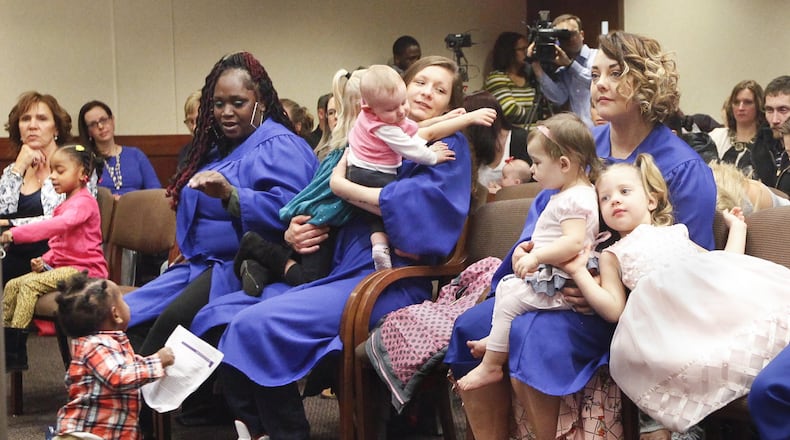The Montgomery County commission at its meeting this week approved the third year of a five-year Substance Abuse and Mental Health Services (SAMHSA) grant for the court. This year’s money totals nearly $400,000 geared toward the “expansion and enhancement” of the program this year.
Credit: JIM NOELKER
Credit: JIM NOELKER
The Montgomery County Juvenile Court’s family treatment program has been running since 2016. Since its inception, the specialized docket has seen 95 graduates and 154 children reunited with their families. So far this year, 25 participants are going through the program.
“We know that the outcomes were great,” said Montgomery County commission president Debbie Lieberman. “We’re just happy that we’re able to continue that treatment. Family treatment court is very important.”
The funding will go toward the continuation of family treatment court, and Wallace said new additions like financial literacy and decision-making classes could begin this year.
“This year, we’ve had the opportunity to really tailor our plans to individuals,” Wallace. “That’s been a big development that we’re really excited about.”
The family treatment court is a “specialized docket,” or a court session that is geared toward therapy or treatment rather than legal action, that runs through the Montgomery County Juvenile Court.
This specialized docket is overseen by Montgomery County magistrate Hope Smalls and has been certified by the Ohio Supreme Court. It runs in partnership with Montgomery County Children Services. Parents can be referred to the family treatment court by a magistrate or Children Services after an adjudication related to abuse, neglect or dependency.
In family treatment court, participating parents are connected to drug and alcohol treatment and meet with a Children Services caseworker and a case manager through the court regularly to explore their progress. Progress can include growing time of sobriety, overcoming parenting challenges, having a good visit with their children and more.
The court provides different incentives to parents as they progress through the program, but the biggest motivator for participating families is often not gifts.
“One of the things that I think holds true for nearly all parents is that the biggest motivator for them is usually their children,” said Wallace. “If they had problems maintaining custody of their children, but see an opportunity to make things better for themselves and their family, by becoming and staying sober… it’s a huge motivator for people.”
Families in the treatment court can be linked to additional services like counseling, housing, employment and other recovery services.
Wallace said family treatment court brings down recidivism and works to address the root causes of addiction by providing wraparound social services to a person recovering from addiction.
“The parents are so motivated to remedy the problem that got them in front of the court, for the best interest of their child and themselves,” Wallace said.
About the Author


